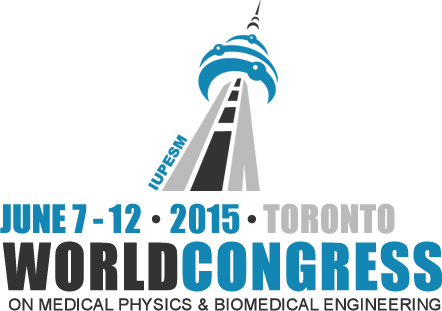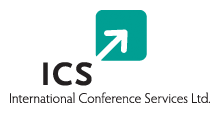President’s Call for Innovative Papers & Abstracts
Submission is now closed.
*Please note: the President’s Call for Innovative Papers & Abstracts are reserved for NEW submissions only. If you have already submitted an abstract during our Regular Call for Abstracts/Papers, DO NOT RESUBMIT to the President’s Call for Abstracts/Papers. Notification of acceptance for the Regular Call will be sent to Presenting Authors by March 16, 2015.

The IUPESM World Congress (WC) on Medical Physics (MP) and Biomedical Engineering (BME) comes but once every three years. WC2015 will be in Toronto from June 7-12. This WC will be the largest gathering of MPs and BMEs from 86 countries. In looking at the content of the meeting, it occurs to me that this is truly a unique opportunity to discuss important Global issues, e.g., Global Health, Food and Water Safety, Environmental toxins, Personalized Medicine, Brain-Machine interfaces, Education and Outreach, etc. When together, we will be able to discuss the Global Challenges we face now and those our children will face. We are working with WHO to address many of these issues. Do you want to work with WHO? In addition to WHO, we collaborate with other international organizations such as the International Atomic Energy Agency (IAEA) in improving global health and safety in medicine. I am therefore calling for new abstract and paper submissions to WC2015 that will be aligned with our 19 Scientific Program tracks, but, in addition will address the Global Challenges within these tracks. In addition, I am looking for novel models of BME and MP academic and training programs. I am also looking for novel Outreach programs. Your abstracts and papers will receive the same peer review and accepted full papers will be published in the same World Congress Proceedings.
Herbert F. Voigt, Ph.D.
Professor, Biomedical Engineering
Boston University
President, IUPESM
Fulbright Scholar, 2014-15
For any inquiries, please contact iupesm2015-speakers at icsevents.com
The World Congress on Medical Physics and Biomedical Engineering will consist of a series of parallel tracks on a wide range of topics of interest to the medical physics and biomedical engineering communities. High-level themes are also identified, and these run through the Congress, embracing submissions from both disciplines, and from a variety of tracks, as appropriate. Authors are invited to identify the track that they wish to submit to, whether their submission fits within an identified theme, and whether they feel the audience would be that of medical physics, biomedical engineering, both, or others. Submissions that are not tied to a theme will be given equal weight to those where relevance to a theme is identified. This will assist the Congress organizers in planning the overall structure of the Congress. Authors are encouraged to submit to all tracks from a world perspective, including high, medium and low resource settings.
Abstract Deadlines
| Regular Call for Abstracts/Papers Submission Deadline |
February 2, 2015 |
| President’s Call for Innovative Abstracts/Papers Submission Deadline |
March 6, 2015 |
Author Notification of Acceptance
Regular Call
President’s Call |
March 16, 2015
March 25, 2015 |
| Early Bird Registration Deadline |
March 31, 2015 |
| Presenting Author Confirmation and Registration Deadline |
April 10, 2015 |
Submission Guidelines
Please click here to download the abstract and paper submission Guidelines.
Congress Themes
- Global Health Challenges
- Evidence and Health Informatics
- Women in Biomedical Engineering and Medical Physics
- Urban Health and Future Earth
- Next Generation Medicine
Expertise/Audience
- Biomedical Engineering
- Clinical Engineering
- Medical Physics
- Joint (equal to choosing both)
- Other (define)
Disease Site/Organ Specific Assignment
- Brain
- Head and Neck
- Thoracic
- Breast
- Cardiovascular
- GU
- GI
- Paraspinal
- Extremity
- Non-specific
Disease Specialty
- Neurodegenerative
- Oncology and Hematology
- Arthritis
- Cardiovascular
- Inflammatory and Autoimmune
- Musculoskeletal
- Transplant
- Diabetes
- Normal Tissue
- Non-specific
- Other (define)
Young Investigator Symposium Competition
Click here for more details
The purpose of the Young Investigator Symposium (YIS) Competitions are to recognize excellence in Congress contributions whose primary authors are young investigators. Young Investigators, as defined below, are encouraged to submit abstracts and full papers for consideration in the following competitions:
- International Organization for Medical Physics (IOMP) J. R. Cunningham Young Investigator Competition
- International Federation of Medical and Biological Engineering (IFMBE) Young Investigator Competition
The highest scored YIS Competition submissions determined by abstract reviewers will be selected to be presented in a special symposium during the World Congress. The number of finalists may vary depending on the number of participants of the Congress and/or the number of Young Investigators who entered the competition, but should not be less than 3 or more than 10.
A panel of judges will then score the oral presentations according to criteria that include originality, clarity, and potential impact on practical applications or theoretical foundations. The top presenters will be announced at the Closing Ceremony for the World Congress.
- If you wish to submit an abstract and full paper for the Young Investigator Competition, you must identify your submission as such.
- To submit to the IOMP J. R. Cunningham YIS Competition, the young investigator must be under the age of 40 at the time of submission and be working in the field of medical physics.
- To submit to the IFMBE YIS Competition, the young investigator must be under the age of 35 at the time of submission and be working in the field of biomedical engineering. This competition is meant for Postgraduate Students and Post-doctoral Fellows.
- Only one submission from each Young Investigator can be submitted for consideration for the Young Investigator Competition.
- The Young Investigator must be the first and presenting author listed for the abstract and paper.
- If you wish to be considered for a Young Investigator Symposium competition, you must submit both an abstract and a full paper.
- Members of the IOMP Presentation Awards Committee and the IFMBE Awards Committee and the appointed panel of judges are not allowed to be authors or co-authors of papers submitted for the competition.
IFMBE Student Competition on Medical Device Design
Click here for more details
The focus of the competition is on the design of a low-cost medical device to improve healthcare in resource-scarce communities. The designs will be judged according the following four criteria:
- Innovativeness
- Potential benefit(s) to the healthcare of resource-scarce communities
- Low cost and ease of deployment
- Viability of the design and potential to reach the market
Eligibility
- All team members must be bona-fide students.
- The projects must have been carried out in the students’ institutions
- Number of members per team can be up to 5
- If you wish to be considered for the Student Competition, you must submit both an abstract and a full paper.
Competition Format
All valid submissions will be reviewed by a judging committee. Ten (10) submissions will be shortlisted for the competition. All shortlisted submissions of the competition are required to present and demonstrate their design during the Congress. Thus it is mandatory that all shortlisted teams (or their respective representatives) must register and attend the Congress, failing which will result in the team being disqualified from the competition.
Congress Tracks
TRACK 1: IMAGING
Topics:
- X-ray Imaging/ Mammography
- Digital Tomosynthesis
- Cone Beam CT
- Computed Tomography
- Magnetic Resonance Imaging & Spectroscopy
- Ultrasound Imaging and Optical Coherence Tomography
- Molecular Imaging (SPECT and PET and Optical)
- Multi-Modality Imaging
- Imaging Bio-impedance and Bioelectric Sources
- Optical Imaging and Microscopy
- X-ray Phase Contrast Imaging
- Imaging Detector Technology
- Digital Phantoms and Monte Carlo Methods
- Quantitative Imaging for Diagnosis and Treatment
- Image Processing, Display and Visualization
- Pathology Imaging
- Computer Aided Diagnosis
- Imaging (Other)
TRACK 2: BIOMATERIALS AND REGENERATIVE MEDICINE
Topics:
- Biomaterials for Cell and Organ Therapies
- Artificial Skin, Bones, Joints, Teeth and Related Biomaterials
- Biofilm-Material Interactions
- Nanotechnology in Regenerative Medicine and Tissue Engineering
- Current Advances in Stem Cell Biology
- Models of Regeneration
- Molecular Mechanisms of Regeneration
- Scaffolds in Tissue Engineering
- Bioreactors in Tissue Engineering
- Functional Tissue Engineering
- Organ Printing
- Other Biomaterials and Regenerative Medicine
TRACK 3: BIOMECHANICS AND ARTIFICIAL ORGANS
Topics:
- Cardiovascular Biomaterials, Artificial Heart and Cardiac Assist Devices
- Orthopaedic Biomechanics
- Cardiovascular Fluid Mechanics
- Dental Mechanics
- Tissue Mechanics
- Cellular and Molecular Mechanics
- Mechanobiology
- Human Movement Biomechanics
- Other Biomechanics and Artificial Organs
TRACK 4: RADIATION ONCOLOGY
Topics:
- Beam Delivery Technology
- Imaging for RT Planning (Contouring, Segmentation, Fusion, Registration, Deformation)
- RT Planning: Strategies (Biological/Physical Optimization, Motion Management, Remote Dose Planning)
- Dose Calculation Methods (Analytical, Monte Carlo)
- Biological/Functional Imaging in Radiotherapy
- Brachytherapy
- Targeted Radionuclide Therapy
- Proton Therapy
- Special Treatment Strategies (Intraoperative, Stereotactic Treatments, Hypofractionation)
- Assessment of Radiotherapy Responses (Imaging and Outcomes)
- Quality Assurance of the Planning & Treatment Delivery Process
- Radiation Program Quality Management
- Patient Safety
- Image-Guided RT
- Motion Management
- Other Radiation Oncology
TRACK 5: DOSIMETRY AND RADIATION PROTECTION
Topics:
- Dosimetry in Therapy (Experiments, Calculations)
- Dosimetry in Imaging (Experiments, Calculations)
- Dosimetry in Nuclear Medicine (Experiments, Calculations)
- Dosimetric Techniques and Phantoms
- Guidelines and Radiation Protection Reference Levels for Patients and Personnel
- Shielding Design
- Micro and NanoDosimetry
- Remote Dose Monitoring, Risk and Dose Optimization
- Dosimetry and Calibration
- Radiation Protection Optimization
- Patient Exposure Tracking
- Nuclear and Radiological Emergencies
- Other
TRACK 6: NEW TECHNOLOGIES IN CANCER RESEARCH AND TREATMENT
Topics:
- Adaptive Radiation Therapy (ART)
- Real-Time Image-Guided Radiation Therapy
- High Intensity Focused Ultrasound (HIFU) Therapy
- Target Ablation by Using Microwave, Radiofrequency, Cryotherapy, etc.
- Nanotechnology in Radiation Therapy and Imaging
- Systemic Therapy
- Small Animal Research Technologies
- Hyperthermia Therapy
- Laser Therapy
- Light Ion Radiotherapy
- Robotics and Mechatronics in Cancer Diagnostic and Therapeutics
- Other
TRACK 7: SURGERY, COMPUTER AIDED SURGERY, MINIMAL INVASIVE INTERVENTIONS, ENDOSCOPY AND IMAGE-GUIDED THERAPY, MODELLING AND SIMULATION
Topics:
- Image-Guided Devices and Systems
- Virtual Reality in Medicine
- Soft Tissue and Vessel Based Navigation
- Endoscopy and Endoscopic Interventions
- Robots and Manipulators in Therapy
- Minimal Invasive Surgery and Instruments
- Modelling and Simulation
- Other
TRACK 8: BIOSENSOR, NANOTECHNOLOGY, BIOMEMS AND BIOPHOTONICS
Topics:
- Biosensors and Nanobiosensors
- Nanoparticles/Nanotheranostics
- Lab-on-chip/Biochips
- Hydrogels for BioMEMS and NEMS, BioMEMS-based 3D Scaffold Fabrication
- Nanotoxicology Characterization, Dosing and Health Effects
- Drug Delivery and Control Release
- Body Sensor Networks
- Other
TRACK 9: BIOSIGNAL PROCESSING
Topics:
- Bio-signal Processing and Physiological Modelling
- Nonlinear Dynamic Analysis of Biomedical Signals
- Signal Pattern Classification
- Adaptive and Parametric Filtering
- Time-frequency Analysis
- Connectivity and Causality
- Blind Source Separation
- Bio-magnetism
- ECG
- Magnetoencephalography (MEG)
- Other
TRACK 10: REHABILITATION MEDICINE, SPORTS MEDICINE, REHABILITATION ENGINEERING AND PROSTHETICS
Topics:
- Translational Medicine in Rehabilitation
- Rehabilitation Engineering
- Sports Medicine
- Prosthetics
- Rehabilitation Robotics
- Other
TRACK 11: NEUROENGINEERING, NEURAL SYSTEMS
Topics:
- Neural Interfaces and Regeneration
- Brain Computer/Machine Interfaces
- NeuroProstheses
- Deep Brain Stimulation
- Motor Learning and Neural Control
- Brain Physiology and Modelling
- Neural Signal Processing
- Functional Neuroimaging and Neuronavigation
- Neurological Disorders
- Transcranial Magnetic and Electric Stimulation
- Epilepsy Monitoring
- Blood Brain Barrier & Pharmacokinetics
- Collaborative Databases in Brain Research
- Other
TRACK 12: MEDICAL DEVICES
Topics:
- Workflow, Patient Specific Modelling
- Diagnostic Devices and Instrumentation, General
- External/Internal/Implanted Therapeutic Devices, General
- Catheter, Laser and Ultrasound Interventions
- Medical Device Design and Standards
- Device integration and interoperability
- Development/deployment in resource-poor nations
- Point of Care Devices and Systems
- Other
TRACK 13: INFORMATICS IN HEALTH CARE AND PUBLIC HEALTH
Topics:
- Epidemiological Studies
- Pattern Classification, Data Mining and Analysis, Machine Learning
- Knowledge Translation and Sharing
- Decision-support Tools in Healthcare
- Electronic Patient, Medical, or Health Records
- Global Health Data Acquisition, Management and Visualization
- Data Models and Representation
- Information Quality, Privacy, Security, and Ethics
- Intelligent Data Analysis
- Public Health and Informatics
- Sensing Systems in Disaster Medicine and Pandemic Diseases
- Other
TRACK 14: INFORMATION TECHNOLOGIES IN HEALTHCARE DELIVERY AND MANAGEMENT
Topics:
- Medical Informatics Technology
- Health Information Systems
- Healthcare Communication Networks and Environments
- Interactions with Health Information Technologies
- Healthcare Modelling and Simulation
- National and International Health IT Efforts and Implementation
- Engineering and Physics Issues with Clinical Trials
- Cybersecurity
- Telemedicine, Distant monitoring, Tele-homecare, and Domotics
- Healthcare IT Standards: PACS, DICOM, IHE, HL7, etc.
- Other
TRACK 15: BIOINFORMATICS
Topics:
- Imaging Informatics/Radiomics
- Proteomics
- Sequence Analysis
- Genome Projects and Annotation
- Computational Evolutionary Biology
- Genetic Algorithms
- Analysis of Gene Expression
- Comparative Genomics
- Network and Systems Biology
- Patient Decision-support Systems
- Other
TRACK 16: CLINICAL ENGINEERING, CLINICAL PHYSICS, AND PATIENT SAFETY
Topics:
- Technology Management Programs
- Usability and Human Factors Engineering for Medical Device and System Design
- Patient Safety, Medical Errors and Adverse Events Prevention related to Health Technologies
- Health Technology Assessment and Economics
- Cost Effective Technologies for Developing Countries
- Biomedical Engineering in Space, Space Physiology and Biology
- Telemedicine in Developing Countries
- Productivity and Benchmarking
- Equipment Management Systems
- International Standards (e.g. IEC)
- Management of Surgical Instruments
- Clinical Process Analysis and Optimization
- Incident Analysis and Management
- Clinical Engineering Certification and Education
- Disaster Preparedness
- Other
TRACK 17: EDUCATIONAL AND PROFESSIONAL ACTIVITIES
Topics:
- Educational and Training in Medical Physics
- Education and Training in Biomedical Engineering
- Education and Training in Clinical Engineering
- Mentorship Programs
- Accreditation, Certification and Licensure Issues
- Regional/Geographical Educational and Professional Issues and Experiences
- Women’s Training Initiatives
- Career Development - Applying for an Academic or Hospital Positions
- Medical Physics in Developing Countries
- Technology Enhanced Education
- Radiation Protection Education and Training of Health Professionals
- Other
TRACK 18: GENDER, SCIENCE AND TECHNOLOGY
Topics:
- Reproductive Technologies, Cloning, Designer Babies
- Inequality in Clinical Testing and Healthcare Provision
- Breast Cancer Screening
- Social Determinants of Health
- Research and Issues on Osteoporosis
- Interactions between Gender and Technology Development
- Gendered Innovations
- Biographies of Women in Science or Engineering
- Archives of Women’s Contributions: What is it Important to Keep?
- Gender Issues in Science and Engineering
- Personal Experiences and Stories of Women in Medical Physics & Biomedical Engineering
- Other
TRACK 19: BIOPHYSICS AND MODELLING
Topics:
- Physics of Cancer
- Biological Modelling
- Transport and Physiological Modelling
- Computational Biology
- Radiobiological Modelling
- Biological Effects of Ionizing Radiation
- Biological Effects of Non-Ionizing Radiation
- Hemodynamics
- Other
Follow us on Twitter or Facebook to receive regular updates about the Congress.















